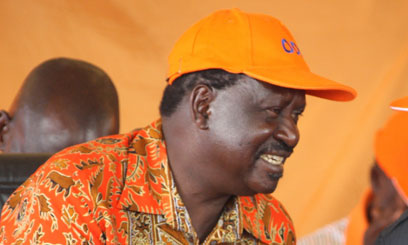Infotrack’s CEO Angela Ambitho said the latest poll suggests that Odinga remains the candidate to beat in the presidential race.
“If things remain as they are, the likelihood of a runoff is very high, because we haven’t seen a situation where we have full throttle campaigns, but when we froze the situations to two candidates you can see how close it gets,” she explained.
“As the elections edges closer, we may not have the crowded field of candidates, or it may dawn on the electorate that it is a two horse race.”
The poll also took into account scenarios where Odinga was put against Vice President Kalonzo Musyoka (61pc against 39pc), his Deputy Musalia Mudavadi (59 pc against 40 pc) and Eldoret North MP William Ruto (64pc and 35pc)
The poll also says that Kenyatta is likely to beat the Vice President and William Ruto in a run-off; against Kalonzo the DPM would poll 58.3 percent against 41.7 percent while against Ruto, Kenyatta would garner 67.3 percent to Ruto’s 32.7 percent.
The ratings of both Odinga and Kenyatta surged minimally by four points according the survey released Monday by Infotrack.
Ambitho said; “The two key candidates have gained almost in equal measure, but is it that the attacks (from member of the G7 Alliance) are making him (Odinga) gain is it popularity, like or sympathy.”
“Secondly even though the attacks have gained him points, also those attacking him have gained, so it is like a win-win situation,” she explained.
Odinga’s popularity rose to 42 percent while Kenyatta polled at 22 percent. Both candidates registered a four percent rise in their ratings since the last time the poll was conducted.
The Prime Minister drew his support from Nyanza (81pc), Western (62pc), North Eastern (61pc), Coast (67pc) and Nairobi (50pc). Kenyatta on the other hand derives his support from Central (61pc), Nairobi (25pc) and Rift Valley (21pc)
Vice President Kalonzo Musyoka polled at 9 percent, Martha Karua 5 percent, William Ruto 5 percent and Musalia Mudavadi 5 percent
Ambitho attributed Mudavadi’s rise on the undecided voters, who might have been drawn in by his intensified campaigns for the ODM party ticket.
“It was brought by two things, one from the undecideds which have gone down, and also which other candidates nationally and from Western Province who he could have taken points away from,” said Ambitho.
“Perhaps with all the political activity now and the machismo then we do see that he is gaining more from the candidates from that region,” she said.
Orange Democratic Movement (ODM) remains the most popular political party at 54 percent, Party of National Unity (PNU) second at 22 percent and Wiper Democratic Movement (WDM) third at 7 percent.
Ninety-one percent of the respondents involved in the survey said they intend to vote in the next general elections. The poll recorded 46 percent apathy among Kenyans sampled, with 29 percent saying they would not vote due the lack of trust in the political leadership, while 17 percent cited that they don’t think it will be of any benefit to vote.
Other reasons given by the respondents include that they don’t have National Identity Cards (28pc), fear of violence (22pc) and the rest said it was still early to decide (6pc) .
Ambitho explained that they sponsored the poll which is done as part of its periodic polling exercise code named, ‘Infobus’, where the firm selects several topical questions which they exclusively own but also send out invitations to corporate, media station, civic society, universities to buy space and sponsor a question in their ‘omnibus survey’.
“The omnibus concept came about that you may want to ask certain questions, but you don’t want to spend too much money, so what happens is all research companies have a monthly or periodic omnibus survey,” she said. “Where we will send out flyers saying our Infobus is going out to do 2,000 or at times 4,000 interviews and invite your firm to buy seats (which mean questions) on our Infobus.”
She said it would cost more than a million shillings to successfully conduct a poll, but when outside players are brought in with samples of questions to inquire about Kenyans views, the cost is slashed to about Sh300,000- Sh450,000.
The findings are however released solely by the entity that sponsored the poll.
“There are specific questions that we own; and those questions are who will you vote for, why will you vote for that person, which party will you vote for, do you intend to vote at all, and anything that can be on current affairs it might be on International Criminal Courts, on the economy etc.”















































